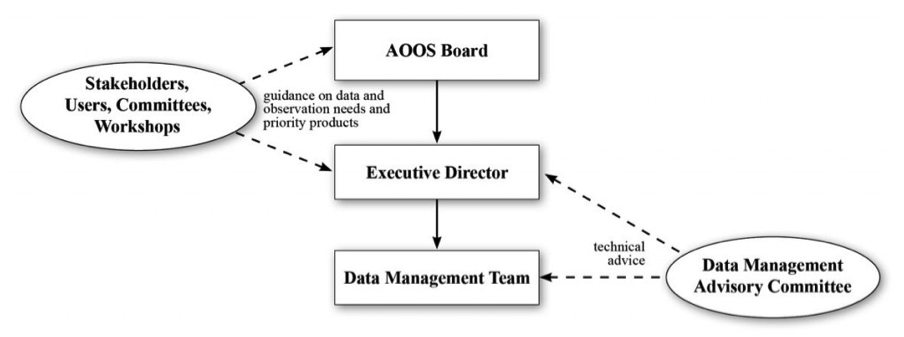AOOS stakeholders and users include:
- Mariners, fishermen and subsistence users who must make decisions that affect their livelihood and safety;
- Search and rescue operations planning effective strategies to save lives;
- Scientists studying Alaska’s ocean ecosystems;
- Coastal security operations ensuring the safety of Alaska’s ports and waters;
- Resource managers seeking ways to use and sustain resources for the future;
- Educators seeking to convey the complexity and connectedness of Alaska’s oceans; and
- All those who ply Alaska’s oceans for their livelihood, subsistence or recreation.
AOOS Stakeholder Engagement Process
AOOS relies on a variety of avenues to engage stakeholders and solicit recommendations. This feedback allows AOOS to both identify gaps in ocean observing and enhance AOOS tools and products. Due to the enormous geographic size of Alaska and the diversity of coastal and marine issues, the AOOS board determined it would be more effective to use existing communication pathways and forums, as well as specific stakeholder engagement events, to provide input to AOOS rather than maintain a standing “stakeholder committee”. This method has allowed AOOS to effectively interact in a focused way with multiple interest groups and hear specific needs.
Facilitating Topic-based Groups
AOOS organizes and facilitates several topic-specific groups by convening relevant partners and discussing objectives, available resources, existing needs, and potential next steps to expand ocean monitoring and data access. These groups include ocean acidification, water level monitoring, impacts of the Blob (Pacific anomalies) in Alaska, integration of long-term observing programs, and reporting on status of Alaska’s coast and oceans.
Hosting Regional Meetings
Since Alaska is such a huge state and observing needs for each geographic region (Arctic, Bering Sea, Aleutian Islands, Kodiak, Cook Inlet, Prince William Sound, Southeast Alaska, etc) differs greatly, AOOS periodically holds regionally focused meetings with key stakeholders to better understand regional needs, identify gaps in ocean observing. Regional focus areas are determined during strategic planning efforts that are held every five years as part of developing its 5-year cooperative agreement with NOAA. Regional meetings are held for these focus areas with discussion focusing on specific local needs. While not all the recommendations will be incorporated into the AOOS Strategic Plan, documenting the needs will allow AOOS to continue to pursue and fill gaps through outside funding sources and collaborative partnerships.
Other Avenues for Ongoing Engagement
AOOS continues to maintain stakeholder engagement efforts outside the strategic planning process through a number of other methods. These include:
- Presentations – AOOS staff provide presentations and data portal demos to national, state, and local audiences on an ongoing basis. A comprehensive list of presentations, demos, and public appearances is located on the AOOS website.
- Scoping Groups – AOOS organizes and runs ad-hoc scoping groups to assess and review new ideas and data tools. Examples have included the Research Assets Map, vessel track visualizations, hex-bin data techniques, and others.
- User Surveys – AOOS employs Survey Monkey when needed to get feedback from broad audiences. Examples have included recommendations for locating Snotel weather stations, establishing the location and timing of seasonal wave buoy deployments, gathering feedback on workshops, and soliciting overall recommendations and ideas for the AOOS program.
- Feedback Tab – Every page on the AOOS data portal includes a red feedback tab, allowing users to submit comments and recommendations regarding specific data and the user interface as a whole. AOOS/Axiom staff responds to each submission within 24 hours, and the feedback is documented, analyzed and assessed for implementation on a systematic basis.
Partner Organizations with Stakeholder Engagement Processes
AOOS participates in the following organizations and relies on input from their stakeholder engagement processes:
- Alaska Center for Climate Assessment & Policy
- Alaska Climate Change Executive Roundtable
- Alaska Sea Grant
- Arctic Landscape Conservation Cooperative
- Bering Sea / Aleutian Islands Landscape Conservation Cooperative
- Cook Inlet Regional Citizens Advisory Council
- Kenai Watershed Fish Habitat Partnership
- North Pacific Fishery Management Council
- North Slope Science Initiative
- Oil Spill Recovery Institute
- Prince William Sound Regional Citizens Advisory Council
- Scenarios Network for Alaska Planning
- Western Alaska Landscape Conservation Cooperative
Organizations to Which AOOS has Provided Presentations or Data Portal Demos
- Alaska Association of Ports & Harbor Masters
- Alaska Center for Climate Assessment and Policy
- Alaska Climate Change Executive Roundtable
- Alaska Congressional Delegation
- Alaska Department of Environmental Conservation
- Alaska Department of Natural Resources
- Alaska Department of Transportation
- Alaska Marine Conservation Council
- Alaska Marine Science Symposium
- Alaska Sea Grant
- Arctic Animal Telemetry Network
- Arctic Council
- Arctic LCC
- Bering Sea/Aleutian Island Landscape Conservation Cooperative
- Bureau of Ocean Energy
- Canadian Beaufort Sea Partnership
- Cook Inlet Regional Citizens Advisory Council
- Distributed Biological Observatory
- Geographic Information Network of Alaska
- Inuit Circumpolar Council
- Kenai Watershed Fish Habitat Partnership
- National Research Council Marine Board
- NOAA Alaska Fisheries Science Center
- NOAA headquarters, Juneau
- North Pacific Fisheries Management Council
- North Slope Borough
- North Slope Science Initiative
- Northern Oil and Gas Forum
- Northwest Arctic Borough Subsistence
- Ocean Research Advisory Panel
- Pacific Arctic Group
- Polar Research Board
- Prince William Sound Regional Citizens Advisory Council
- R&M Engineering


